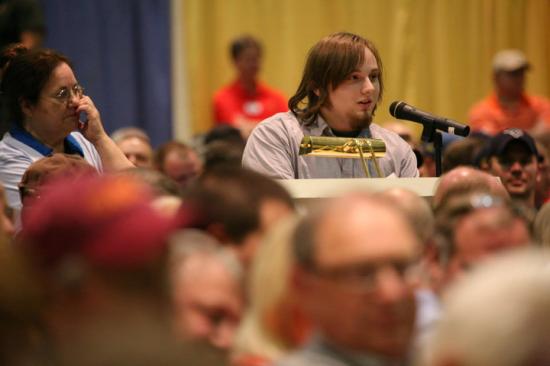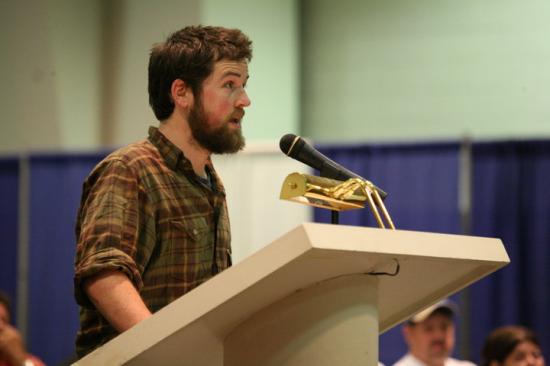
Spruce No. 1 Clean Water Act Permit Hearing
May 23, 2010
Several hundred citizens gathered in the Charleston Civic Center Tuesday night for an EPA-sponsored public hearing on their agency's "proposed determination" to block the Clean Water Act permit for the Spruce No. 1 surface mine.
If allowed to move forward, the Spruce No. 1 mine would be the largest in West Virginia history and cover 7 miles of streams in Logan County, W.Va., near Blair. The Army Corps of Engineers approved a scaled-back version of the permit in 2007, which the EPA moved to veto last October. In March of 2010, the EPA announced a "proposed determination" to block the Clean Water Act Permit for the mine, saying it had"reason to believe that the Spruce No. 1 Mine, as currently authorized, could result in unacceptable adverse effects to fish and wildlife resources."
Despite the deeply divided sentiments that pervaded the room, the hearing proceeded in a civil manner, with the crowd respectfully allowing each speaker their allotted two minutes.
“I’m glad that the EPA has finally decided to be the Environmental Protection Agency and not the Economic Protection Agency, “ said Junior Walk, 20, a Coal River Valley local and organizer with Coal River Mountain Watch. A former coal company employee, Walk told the crowd that he believes no one should have to grow up with poisoned water, as he did.
Speakers who opposed the permit included residents, a former UMWA miner, anti-mountaintop removal activists and scientists. They argued against the permit from a wide variety of angles, pointing out the health, environmental, human and economic impacts of coal.
“I’m glad that the EPA has finally decided to be the Environmental Protection Agency and not the Economic Protection Agency, “ said Junior Walk, 20, a Coal River Valley local and organizer with Coal River Mountain Watch. A former coal company employee, Walk told the crowd that he believes no one should have to grow up with poisoned water, as he did.
Speakers who opposed the permit included residents, a former UMWA miner, anti-mountaintop removal activists and scientists. They argued against the permit from a wide variety of angles, pointing out the health, environmental, human and economic impacts of coal.
Robert Goodwin, an environmental permit analyst and researcher with Coal River Mountain Watch, used his two minutes to make some suggestions to the National EPA. Because the EPA so often offers coal companies variances when it comes to parts of the valley fill permitting process, Goodwin wryly questioned why laws regarding overburden and water quality even existed.
The opposition was heavily weighted with coal industry higher-ups and politicians. Nick Rahall of West Virginia's 3rd Congressional District compared Gulf fisherman whose livelihoods have been ravaged by the recent oil spill to the impact vetoing Spruce No. 1 would have on strip miners-- despite the fact that fishermen livelihoods were ruined by an extractive industry. Bill Raney of the West Virginia Coal Association and Randall Maggard, a manager at Argus Energy, also spoke—emphasizing that vetoing the permit would take away jobs and create a precedent that could threaten the mining industry as a whole. No one in favor of the permit mentioned that economically mineable coal will likely be gone from southern West Virginia within the next few decades.
Strip miners and residents were among the pro-Spruce speakers, but comprised a minority. Representatives of the Logan Chamber of Commerce and the county schools, both of which receive coal severance tax dollars, spoke out in favor of the permit.

















